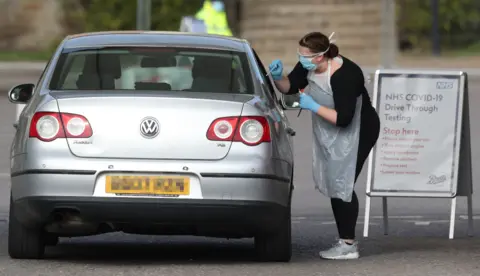Coronavirus testing to be rolled out to more public service staff
 PA Media
PA MediaCoronavirus testing will be rolled out to people working in public services such as police, fire and prison staff, Health Secretary Matt Hancock has said.
Capacity was rising "sharply" but not as many NHS staff had come forward for tests as had been expected, he said.
The government said 21,328 tests were carried out on Thursday but there had been capacity for at least 38,000.
Meanwhile, scientists say they should have at least a million doses of a coronavirus vaccine by September.
However, Business Secretary Alok Sharma said there were "no guarantees" and it was not possible to put a date on when a vaccine would be created by.
Producing one is "a colossal undertaking" and "a complex process which will take many months", he told the government's daily press briefing.
It comes as the UK recorded 847 new coronavirus-related deaths in hospitals on Thursday, taking the total to 14,576.
The figure does not include hundreds more who have died in care homes and the community.

- A SIMPLE GUIDE: How do I protect myself?
- AVOIDING CONTACT: The rules on self-isolation and exercise
- LOOK-UP TOOL: Check cases in your area
- STRESS: How to look after your mental health

Speaking by videolink to an online meeting of the Commons health committee earlier, Mr Hancock said the government had prioritised testing for hospital patients and NHS workers before expanding it to residents and staff in social care.
He added some 50,000 NHS workers had been tested so far.
However, he said it was "frustrating" there was capacity for 10,000 more tests a day than were carried out on Thursday.
The government has a target of 100,000 tests a day by the end of April.
Eligibility for testing will also be expanded to critical local authority workers, the judiciary and Department for Work and Pensions staff, he said.
"We're able to do that because of the scale-up of testing," he added.
Mr Hancock said he hoped anyone with symptoms would be able to be tested "relatively soon".
"Now we've got the curve under control, I want to be able to get back to the position that we can test everybody with symptoms - and I anticipate being able to do that relatively soon because we're increasing capacity, as I say," he said.
Matt Wrack, general secretary of the Fire Brigades Union, welcomed the expansion of testing.
However, he added: "It is a shame it has come this late, with thousands of firefighters already self-isolating - this is something that could have been easily avoided."
Mr Wrack said there were also issues around how accessible testing was, with many testing centres far out of town.
Dame Donna Kinnair, chief executive of the Royal College of Nursing, told the committee some sick NHS workers were compelled to drive for up to two hours to be tested.
'Further waves'
Also speaking to the committee, Prof Anthony Costello, the director of University College London's Institute for Global Health, said there could be 40,000 deaths in the UK as a result of the coronavirus pandemic.
He said the UK had been "too slow" to react on a number of fronts to the crisis which may lead to it having "probably the highest death rate in Europe".
Sir Patrick Vallance, the government's chief scientific adviser, previously said it would be a "good outcome" if total UK deaths could be kept below 20,000.
Warning that the UK would face "further waves" of the virus, Prof Costello said a system needed to be put in place that "cannot just do a certain number of tests in the laboratory" but one that reached out at "district and community level".
Speaking at the briefing, Sir Patrick said there was beginning to be a "gradual decrease" in the number of coronavirus patients in London hospitals and a flattening or decrease in other areas.
"The numbers are not only at a plateau but beginning to come down in some areas and that will translate into fewer people in intensive care in due course," he said.
"But do not expect this to be quick. This is not going to be a sudden drop, there will be a plateau - it will take a while for the numbers to come right down and that's why it's important that we continue with the strong social distancing measures that we have in place."
Sir Patrick added that he unfortunately expected the number of coronavirus-related deaths to continue to plateau "for a little while" before starting to come down slowly.
In other developments:
- Chancellor Rishi Sunak has extended the government's furlough scheme by another month until the end of June
- Councils in England have warned that the coronavirus crisis is pushing them to the brink of financial failure
- Downing Street suggested summer holidays should not be booked yet as there is no certainty about when the lockdown will be lifted and travel can resume
- The public in the UK will not be told to wear face masks unless the government's scientists say it is necessary, a minister has said
- The Chinese city of Wuhan, where the outbreak first began, has raised its death toll by 50% - equal to 1,290 cases - attributing it to updated reporting and more deaths from outside hospitals being included in the figures